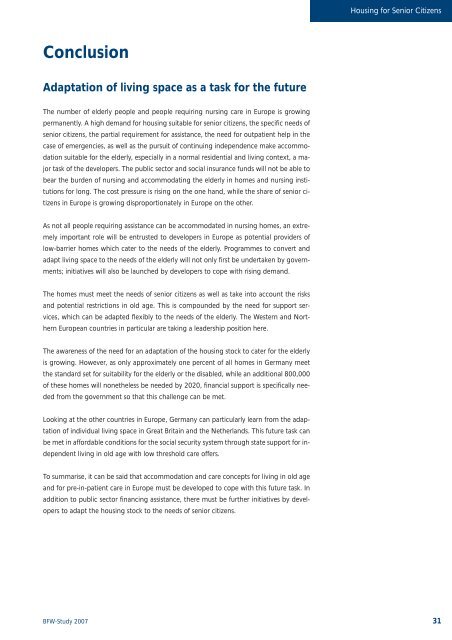BFW-Studie - European Union of Developers and House Builders
BFW-Studie - European Union of Developers and House Builders
BFW-Studie - European Union of Developers and House Builders
Create successful ePaper yourself
Turn your PDF publications into a flip-book with our unique Google optimized e-Paper software.
Housing for Senior Citizens<br />
Conclusion<br />
Adaptation <strong>of</strong> living space as a task for the future<br />
The number <strong>of</strong> elderly people <strong>and</strong> people requiring nursing care in Europe is growing<br />
permanently. A high dem<strong>and</strong> for housing suitable for senior citizens, the specific needs <strong>of</strong><br />
senior citizens, the partial requirement for assistance, the need for outpatient help in the<br />
case <strong>of</strong> emergencies, as well as the pursuit <strong>of</strong> continuing independence make accommodation<br />
suitable for the elderly, especially in a normal residential <strong>and</strong> living context, a major<br />
task <strong>of</strong> the developers. The public sector <strong>and</strong> social insurance funds will not be able to<br />
bear the burden <strong>of</strong> nursing <strong>and</strong> accommodating the elderly in homes <strong>and</strong> nursing institutions<br />
for long. The cost pressure is rising on the one h<strong>and</strong>, while the share <strong>of</strong> senior citizens<br />
in Europe is growing disproportionately in Europe on the other.<br />
As not all people requiring assistance can be accommodated in nursing homes, an extremely<br />
important role will be entrusted to developers in Europe as potential providers <strong>of</strong><br />
low-barrier homes which cater to the needs <strong>of</strong> the elderly. Programmes to convert <strong>and</strong><br />
adapt living space to the needs <strong>of</strong> the elderly will not only first be undertaken by governments;<br />
initiatives will also be launched by developers to cope with rising dem<strong>and</strong>.<br />
The homes must meet the needs <strong>of</strong> senior citizens as well as take into account the risks<br />
<strong>and</strong> potential restrictions in old age. This is compounded by the need for support services,<br />
which can be adapted flexibly to the needs <strong>of</strong> the elderly. The Western <strong>and</strong> Northern<br />
<strong>European</strong> countries in particular are taking a leadership position here.<br />
The awareness <strong>of</strong> the need for an adaptation <strong>of</strong> the housing stock to cater for the elderly<br />
is growing. However, as only approximately one percent <strong>of</strong> all homes in Germany meet<br />
the st<strong>and</strong>ard set for suitability for the elderly or the disabled, while an additional 800,000<br />
<strong>of</strong> these homes will nonetheless be needed by 2020, financial support is specifically needed<br />
from the government so that this challenge can be met.<br />
Looking at the other countries in Europe, Germany can particularly learn from the adaptation<br />
<strong>of</strong> individual living space in Great Britain <strong>and</strong> the Netherl<strong>and</strong>s. This future task can<br />
be met in affordable conditions for the social security system through state support for independent<br />
living in old age with low threshold care <strong>of</strong>fers.<br />
To summarise, it can be said that accommodation <strong>and</strong> care concepts for living in old age<br />
<strong>and</strong> for pre-in-patient care in Europe must be developed to cope with this future task. In<br />
addition to public sector financing assistance, there must be further initiatives by developers<br />
to adapt the housing stock to the needs <strong>of</strong> senior citizens.<br />
<strong>BFW</strong>-Study 2007 31










